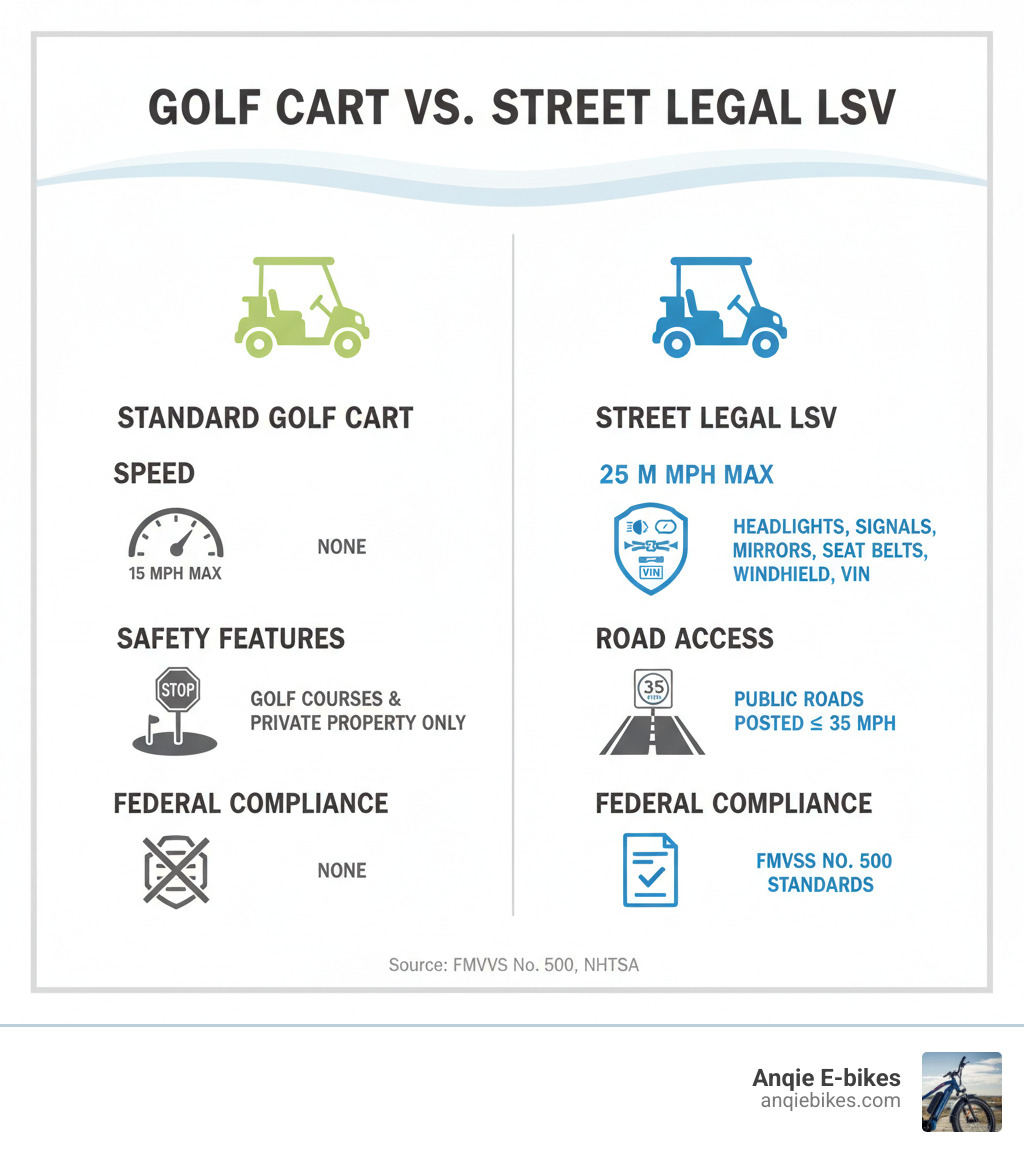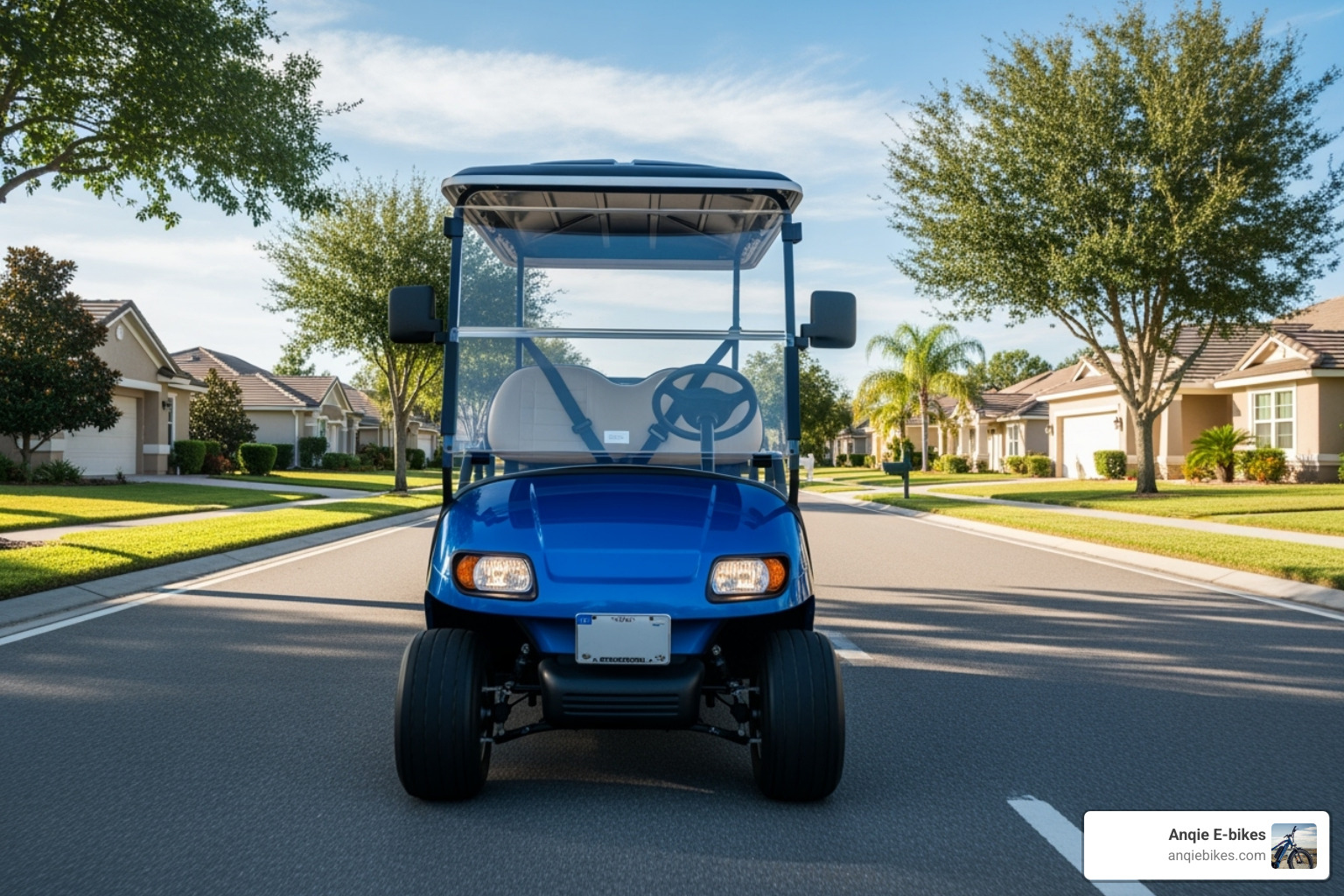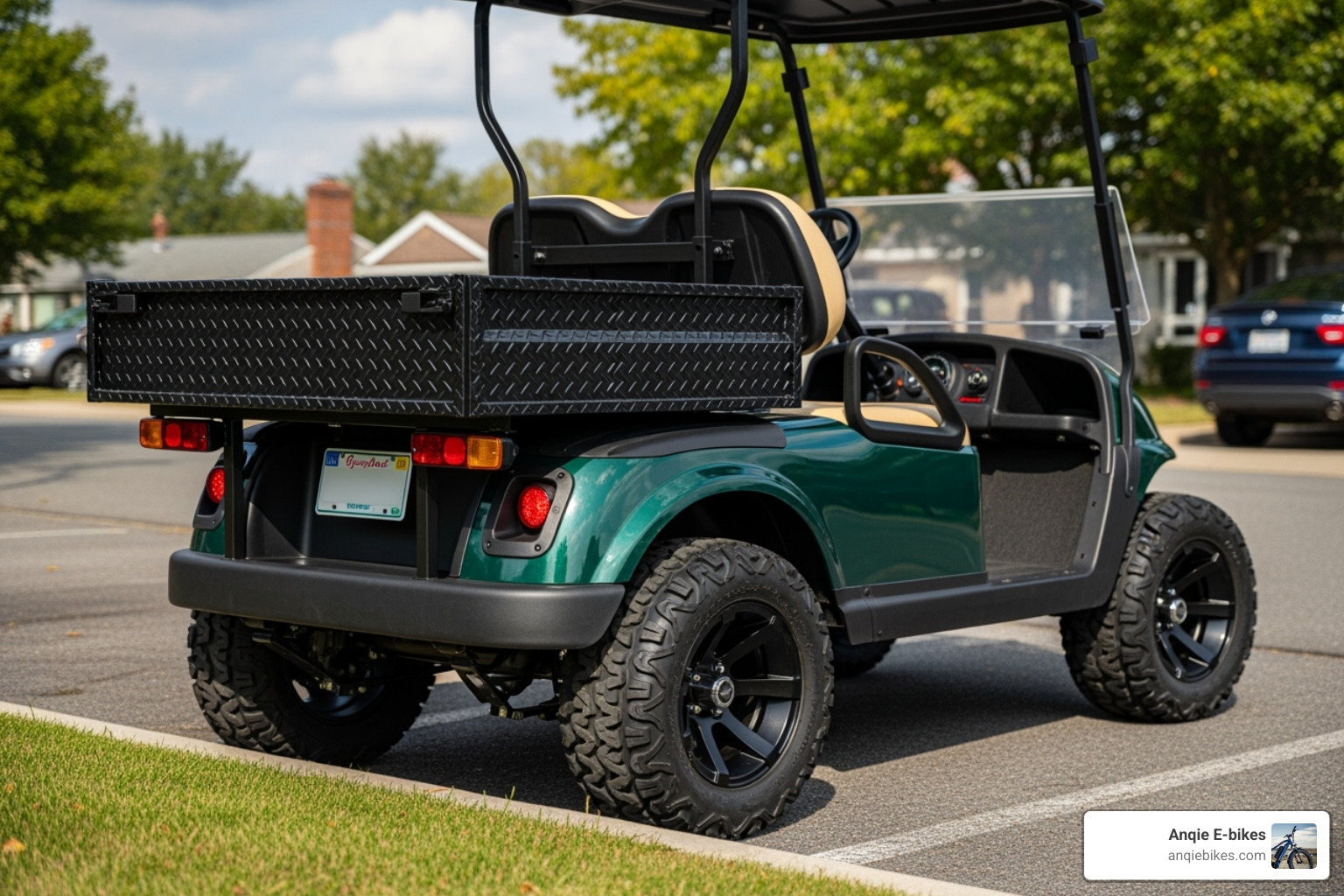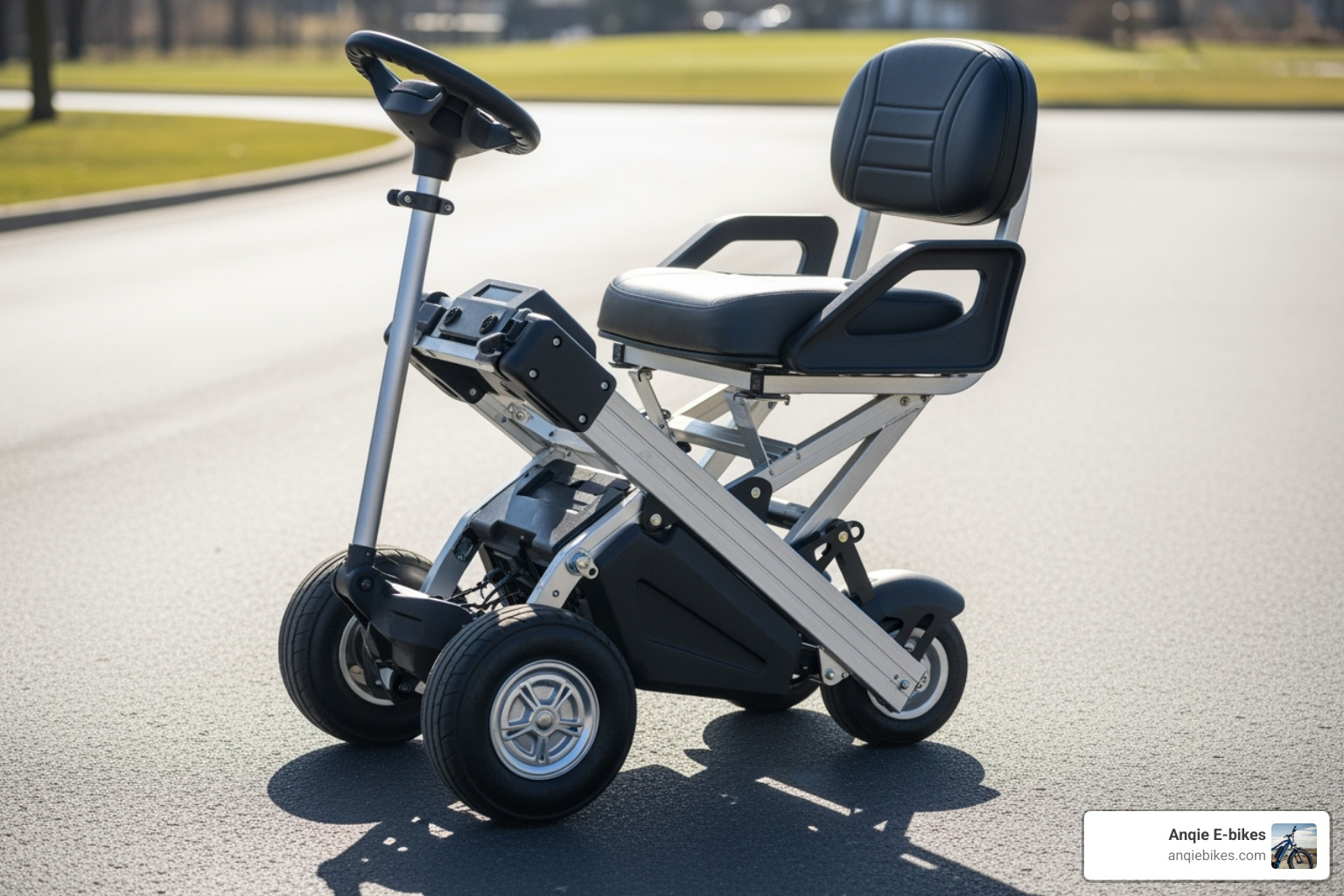Why Street Legal Golf Carts Are Changing Neighborhood Transportation
A street legal golf cart is more than just a vehicle for the greens—it’s a fully compliant Low-Speed Vehicle (LSV) designed to legally operate on public roads with speed limits of 35 mph or less. Here’s what makes them street legal:
Key Differences from Traditional Golf Carts:
- Speed Capability: Up to 25 mph (vs. 15 mph for standard golf carts)
- Required Safety Features: Headlights, turn signals, stop lamps, mirrors, seat belts, VIN, DOT windshield
- Road Access: Can legally drive on designated public roads
- Federal Compliance: Must meet FMVSS No. 500 safety standards
Primary Benefits:
- Eco-friendly alternative to traditional vehicles for short trips
- Reduced traffic congestion in communities
- Lower operating costs for local errands
- Fun, accessible transportation for neighborhoods, campuses, and resorts
The rise of street legal golf carts represents a shift in personal transportation. These convenient vehicles offer significant savings and provide a nimble alternative to full-size cars for local trips.
Perfect for communities, campuses, or daily errands, street legal golf carts blend practicality with environmental responsibility. Cruising at up to 25 mph, they are an efficient alternative to oversized cars for local travel.

Understanding the “Street Legal” Designation
The key difference between a regular golf cart and a street legal golf cart is the Low-Speed Vehicle (LSV) classification. This federal designation, governed by the Federal Motor Vehicle Safety Standard No. 500 (FMVSS No. 500), defines a category for four-wheeled vehicles that can reach speeds up to 25 mph and weigh under 3,000 pounds.
This allows your LSV-compliant cart to legally drive on most public roads with speed limits of 35 mph or less, giving you the freedom to run local errands without legal concerns. It creates a perfect middle ground between a traditional golf cart and a full-sized car, offering convenience for short trips.

Key Safety Features You Can’t Ignore
To be street-legal, a cart must have specific, federally mandated safety features. These aren’t optional. Every street legal golf cart must include:
- Headlamps, taillamps, and stop lamps for visibility.
- Front and rear turn signals to indicate direction.
- A DOT-approved windshield that is shatter-resistant for protection.
- Mirrors (driver’s side exterior and either a passenger-side or interior mirror) for awareness. Many modern carts also include backup cameras.
- A Vehicle Identification Number (VIN) for registration and proof of compliance.
- A parking brake to secure the vehicle when stopped.
- An alert sound, like a horn, for communication.
- Seat belt assemblies for every designated seat, meeting federal standards.
- Reflex reflectors on the sides and rear for improved visibility in low light.
These features work together to ensure the vehicle is safe for you, your passengers, and everyone else on the road.
A Note on Local Regulations
Federal standards are the baseline, but state and local governments can add their own rules. Regulations for LSVs can vary significantly by location, as we’ve seen from our base in Brooklyn, NY. Before driving, check with your local DMV or city hall about:
- Permitted Roads: Which streets in your area allow LSVs.
- Registration: Your street legal golf cart must be registered with the state DMV and display proper plates. The process is usually similar to registering a car.
- Insurance: Most states require at least liability coverage for LSVs. Contact your insurance provider to ensure you are properly covered.
A quick check of local regulations ensures you can operate your cart legally and with confidence. At Anqie E-bikes, we can help guide customers in understanding these requirements.
Top Picks: Finding the Best Street Legal Golf Cart for Your Needs
Choosing the right street legal golf cart depends on your lifestyle and intended use. The good news is there’s a model for nearly every need, from quick grocery runs to serious property management.
Let’s break down which street legal golf cart might be your perfect match.
Best for Neighborhood Cruising and Short Errands
For local errands like visiting a café or market, a 2-4 passenger model is ideal. These compact carts are agile, easily navigating narrow streets and tight parking spots. Electric models with lithium-ion batteries provide ample range for daily use. Look for comfort features like premium seating and cup holders, with options for Bluetooth audio systems to improve your short commutes. They offer a perfect balance of practicality and fun for neighborhood life.
Best for Families and Communities
For family transport in communities, resorts, or on campuses, 4-6 passenger street legal golf carts are the solution. Models with forward-facing seating keep passengers comfortable, while versatile rear flip seats can convert from passenger space to a cargo bed for groceries or gear. Key safety features, including seat belts for every position, provide peace of mind for parents. These carts also offer ample storage and modern conveniences like LCD displays and backup cameras, making them perfect for the demands of family life.
Best for Utility and Hauling
For work-related tasks on large properties or for small businesses, utility-focused street legal golf carts are invaluable.

These models feature robust utility beds with 800+ lbs cargo capacity, and some heavy-duty versions can handle payloads over 1,400 lbs and tow more than 1,200 lbs. Lifted suspension provides extra ground clearance for rough terrain, while heavy-duty frames ensure durability for commercial use at resorts, farms, or manufacturing sites. They offer a powerful, eco-friendly alternative to trucks for property-based work, combining muscle with street-legal compliance.
Key Considerations Before You Buy
A little planning before buying a street legal golf cart will shape your entire ownership experience and save headaches later. Here are some important factors to consider.
| Feature | Gas | Standard Electric (Lead-Acid) | Lithium-Ion Electric |
|---|---|---|---|
| Range | Excellent (depends on fuel tank size) | Good (typically 20-40 miles) | Excellent (typically 40-80+ miles) |
| Maintenance | More frequent (oil changes, filters, etc.) | Moderate (battery watering, terminal cleaning) | Low (virtually maintenance-free batteries) |
| Upfront Cost | Moderate | Lower | Higher |
| Performance | Consistent power, higher torque | Smooth, quiet, instant torque | Strong, consistent power, lighter, faster charge |
The first major decision is the power source. Gas-powered carts offer excellent range and easy refueling but require more maintenance (oil changes, filters). Electric carts are quiet, zero-emission, and require less upkeep. Within electric models, standard lead-acid batteries are cheaper upfront but are heavy, require regular maintenance, and have a shorter lifespan. Lithium-ion batteries, while more expensive initially, are the modern standard. They are lightweight, charge faster, last longer, are maintenance-free, and provide consistent power without performance drop-off as the battery drains.
Consider your needs for seating capacity, from 2-seaters for errands to 6- or 8-seaters for groups, with many offering versatile rear flip seats that convert to cargo space. Customization is a key benefit. You can personalize your cart with custom colors, lift kits, all-terrain tires, Bluetooth audio, and upgraded lighting. Click here to build a cart to your exact preferences including any custom Pantone color of your choosing from hot pink to aquamarine. These customizations are included in the base pricing.
While speed is capped at 25 mph, range varies. Lithium-ion models offer 40-80+ miles per charge, while gas models are limited only by fuel. Modern carts also feature advanced technology like LCD displays, backup cameras, 4-wheel braking, and improved suspension for a safer, more comfortable ride.
Understanding the Cost of a Street legal golf cart
The cost of a street legal golf cart can range from around $12,999 to $24,000+, depending on features. New carts offer warranties and modern tech, while used carts can be cheaper but may require maintenance. Key factors influencing price include battery type (lithium is more expensive), seating capacity, brand, accessories, and whether the model is lifted. Set a budget and prioritize features that matter most to you.
Financing Your New Ride
Financing can make owning a street legal golf cart more accessible. Many dealers offer competitive loan rates, with options for pre-approval without a hard credit check. This allows you to spread the cost over manageable monthly payments. Get instant rates as low as 0% APR through our partner Enhancify. Pre-approval without a hard credit check required. This straightforward process can make ownership a practical reality without financial strain.
Owning Your Cart: Maintenance, Warranties, and Service
Years of reliable use are the real joy of owning a street legal golf cart. The good news is they are generally easier to maintain than cars, especially with the right care.
General Maintenance Tips
Regular maintenance ensures your cart’s longevity and performance.
- Battery Care: This is crucial. Lead-acid batteries require monthly water level checks (use distilled water) and terminal cleaning. Lithium-ion batteries are virtually maintenance-free; just follow proper charging and storage procedures.
- Tire Pressure: Check every few weeks to ensure proper inflation for safety, handling, and range.
- Brake Checks: Periodically inspect the 4-wheel brakes for wear. Address any unusual noises or reduced stopping power professionally.
- General Checks: Regularly wash your cart and check that all lights and signals are functioning correctly for safety.
Warranty Coverage
A good warranty provides peace of mind. Inquire about coverage details when buying. Battery warranties are a key indicator of quality; lithium-ion batteries often have up to 5-year warranties, while lead-acid is typically 1-2 years. A powertrain warranty (usually ~2 years) covers the motor and controller. Understand what’s included in the overall warranty to avoid surprises.
Finding Reputable Service
For professional service, start with your local dealer or the manufacturer’s authorized service network. As an e-bike and marine equipment specialist in Brooklyn, NY, Anqie E-bikes understands the importance of qualified service and can help customers connect with providers. For wider searches, online directories like Golf Cart Search | Find Top-Rated Golf Cart Dealers & Services can locate rated professionals in your area. Look for providers who offer clear communication and transparent pricing.
Frequently Asked Questions about Street Legal Golf Carts
Let’s clear up some of the most common questions about street legal golf carts.
What is the real difference between a street legal golf cart and an LSV?
LSV (Low-Speed Vehicle) is the official federal classification that makes a vehicle “street legal.” A street legal golf cart is a vehicle manufactured from the factory as an LSV. Unlike a traditional golf cart (max speed ~15 mph, for private use), an LSV meets federal safety standards (FMVSS 500), has a top speed of 25 mph, and is equipped with features like headlights, seat belts, and a VIN, allowing it to be driven on public roads.
Do I need a special license or insurance to drive one?
You only need a standard driver’s license. Insurance requirements vary by state, but most mandate liability coverage similar to a car because you’ll be on public roads. Always check with your local DMV for registration rules and contact your insurance provider to confirm you have the correct coverage for an LSV in your area.
What are the main limitations of a street legal golf cart?
It’s important to know their limitations for safe and legal operation:
- Speed: LSVs are federally capped at 25 mph.
- Road Access: They are restricted to roads with posted speed limits of 35 mph or less. They are not permitted on highways or major high-speed roads. Local rules may add further restrictions.
- Range: Operation is limited by battery capacity or fuel tank size. While modern electric models can have a range of 40-80+ miles, longer trips require planning for recharging or refueling.
These limitations define their role as a solution for short-distance, local transportation.
Conclusion
The street legal golf cart is a practical, eco-friendly, and fun solution for neighborhood transportation. These Low-Speed Vehicles offer the freedom to handle local trips without the cost or impact of a full-size car. With options for every need—from 2-seat cruisers to 6-seat family models and heavy-duty utility carts—their versatility is clear. Modern features like lithium-ion batteries, extensive customization, and federally mandated safety standards make them a valuable investment with low operating costs.
At Anqie E-bikes, we are passionate about electric personal transportation. While we specialize in e-bikes and dirt bikes, we recognize that street legal golf carts share the same spirit of innovation and efficiency. They are a key part of the move toward smarter, more enjoyable local travel.
If you’re looking for an even more compact and portable option, consider this innovative model:

For a compact, efficient, and fun option, explore our Kandi Collapsible Mini Electric Golf Cart. It combines the convenience of a street legal cart with unique portability, perfect for those who value flexibility. The future of neighborhood transport is bright, electric, and fun.
